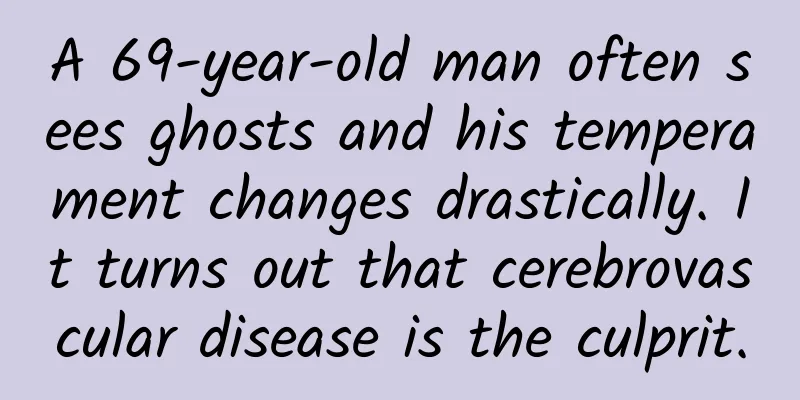A 69-year-old man often sees ghosts and his temperament changes drastically. It turns out that cerebrovascular disease is the culprit.

|
During the consultation, we met a patient. The patient was a 69-year-old male with a history of hypertension and hyperlipidemia for many years. The patient kept muttering "there is a ghost" and "there is a ghost". The family told us that the patient's temperament suddenly changed a few days ago. He was originally a very gentle person, but he became irritable and angry at every turn. Later, he often talked to himself and kept shouting that there was a ghost. The family thought that the patient was possessed by evil spirits, so they quickly invited a local witch. However, after inviting the witch, the patient's symptoms did not change. The family thought the patient had a mental illness, and went to the psychiatry department to see a doctor, but it was still ineffective. The doctor in the psychiatry department suggested that the patient go to the neurology department to check whether there was a cerebral infarction. So, they took the patient to the neurology department to see if there was a brain disease. After asking the patient's specific situation, they arranged for the patient to have a head examination. After asking about the patient's specific situation, the initial judgment was that it was a thalamic infarction. In people's minds, when it comes to cerebral infarction, everyone generally thinks that the patient's symptoms are crooked corners of the mouth, numbness of one side of the limbs, blackness in front of the eyes, etc. In fact, the brain is the commander-in-chief that controls people's actions, thinking, emotions, and perceptions. When brain lesions occur, the patient's personality and thinking may also change accordingly. After a thalamic infarction occurs, a person's senses and ability to receive and process information are affected, and the patient may experience a drastic change in temperament, irritability, mental disorders, memory disorders, and other problems. The patient's brain examination results also showed thalamic infarction, which requires treatment as soon as possible. The treatment of cerebral infarction is determined according to different causes, pathogenesis, clinical types and onset time, and different people are treated in different ways. Patients who are suitable for thrombolytic therapy receive thrombolytic therapy, patients who are suitable for drug therapy receive drug therapy, and some patients may also receive surgical treatment. The elderly are a high-risk group for stroke. When a patient shows obvious abnormalities, it is recommended that the patient's family members take the patient to the neurology department to observe whether the patient has organic brain lesions. If there are abnormalities, active treatment should be carried out to reduce the patient's disability rate. |
Recommend
It has been made clear: it is prohibited to produce and publish videos of overeating. How harmful are overeating?
Overeating is harmful to your health and wasting ...
Sciatic nerve compression in pregnant women
The sciatic nerve runs through the upper and lowe...
Can Jiayin treat pelvic effusion?
Pelvic effusion is a disease that many women suff...
What should pregnant women do if they have sore throat?
During pregnancy, a pregnant woman's body fun...
Confinement meal stir-fried vegetables
For women, confinement is a very important thing....
Are Type 3 hypoechoic breast nodules serious?
Bilateral breast hypoechoic nodules type 3 cannot...
What if I am pregnant even though the follicle is luteinized?
The health of follicles is very important to peop...
What medicine is used for vaginal odor
Leucorrhea refers to the secretions in the female...
What causes pain around the breast?
There is not a single cause for pain around the b...
Can I get pregnant if I have sex after my ovulation period?
You can have sex after the ovulation period, but ...
What to do if you have bleeding during intercourse three months after giving birth
Since expectant fathers and expectant mothers are...
Cervical erosion was treated with Lip surgery
The probability of women developing cervical eros...
What can’t you eat during ectopic pregnancy?
The ectopic pregnancy that people often talk abou...
Recipes for women to replenish qi and blood
Female friends often need to supplement their bod...
What is "sublingual thrombectomy"? What are its effects? This article will help you understand it clearly
In the pursuit of health, people are constantly l...









![[Popular Science Lecture] For premature babies, breastfeeding is not only the most natural "food" but also a special "medicine" - let breastfeeding help healthy growth](/upload/images/67f1984929113.webp)